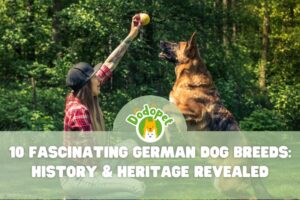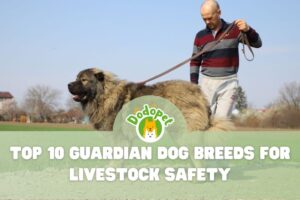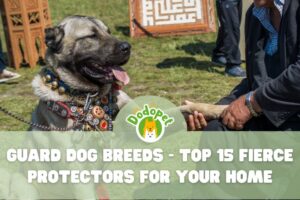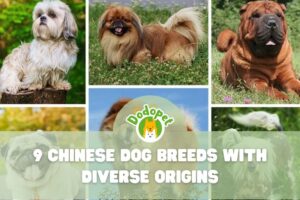The Importance of Understanding Different Types of Dogs
Understanding the different types of dogs is crucial for any dog lover or potential dog owner. By familiarizing yourself with the various breeds, you can make an informed decision when choosing a dog that suits your lifestyle and preferences. Each breed has its own unique characteristics, temperaments, and care requirements. Whether you are looking for a small lap dog or an active companion for outdoor adventures, knowing the different types of dogs will help you find the perfect match.
Knowing the all types of dogs allows you to:
- Choose a dog that matches your lifestyle and living situation
- Understand the specific needs and care requirements of different breeds
- Ensure compatibility between your family and the chosen breed
- Make an informed decision when adopting or purchasing a dog
- Appreciate the diversity and beauty of the canine world
Understanding Dog Breeds: The Basics
Before delving into the different types of dog breeds, it is essential to understand the basics of dog breeds. A breed is a specific group of dogs that share common physical traits, temperaments, and genetic characteristics. Breeds are typically recognized by kennel clubs and breed organizations, which establish breed standards to maintain consistency within each breed. Dog breeds are classified into various groups or categories based on their characteristics and purposes.
The most common classification system includes:
- Working Group
- Herding Group
- Sporting Group
- Non-Sporting Group
- Toy Group
- Hound Group
- Terrier Group
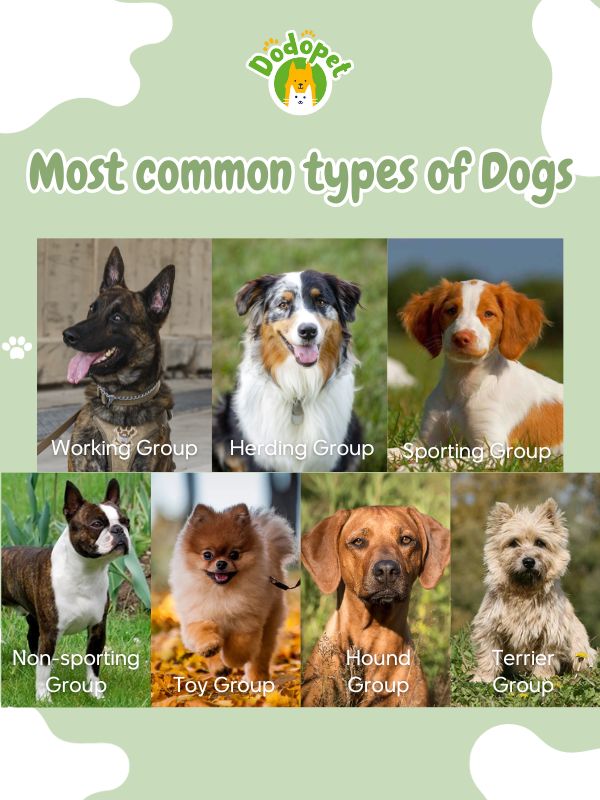
The Importance of Understanding Different Types of Dogs
Exploring Different Types of Dogs
Now that you have a basic understanding of dog breeds, let’s explore the different types of dog breeds and their unique qualities. From small companion breeds to large working dogs, there is a wide range of options to suit every preference and lifestyle.
Sporting Dogs: Active Types of Dogs
Sporting dogs are a group of breeds known for their athleticism, hunting abilities, and friendly personalities. They are often used in various forms of hunting, such as bird hunting and retrieving. These dogs are characterized by their energy, endurance, and love for the outdoors. Here are profiles and characteristics of some common sporting dog breeds:
- Labrador Retriever: one of the most popular dog breeds in the United States. They are known for their friendly and outgoing nature. Labs are highly intelligent, easy to train, and make excellent family pets. They excel in retrieving and are often used in hunting and as service dogs.
- Golden Retriever: renowned for their friendly and gentle temperament. They are also highly intelligent and easy to train. These dogs are excellent with families and children. They are often used in hunting and as therapy dogs due to their loving nature.
- German Shorthaired Pointer: versatile and energetic hunting dogs. They are known for their keen sense of smell and pointing skills. These dogs are highly active and require regular exercise and mental stimulation.
- English Springer Spaniel: medium-sized dogs known for their distinctive “springing” gait. They are excellent hunters and can work both on land and in water. They are friendly, trainable, and make great family pets.
- Cocker Spaniel: known for their beautiful, silky coats and cheerful personalities. They are excellent flushing dogs, used in hunting to flush game out of hiding. They are affectionate, easy to train, and great companions.
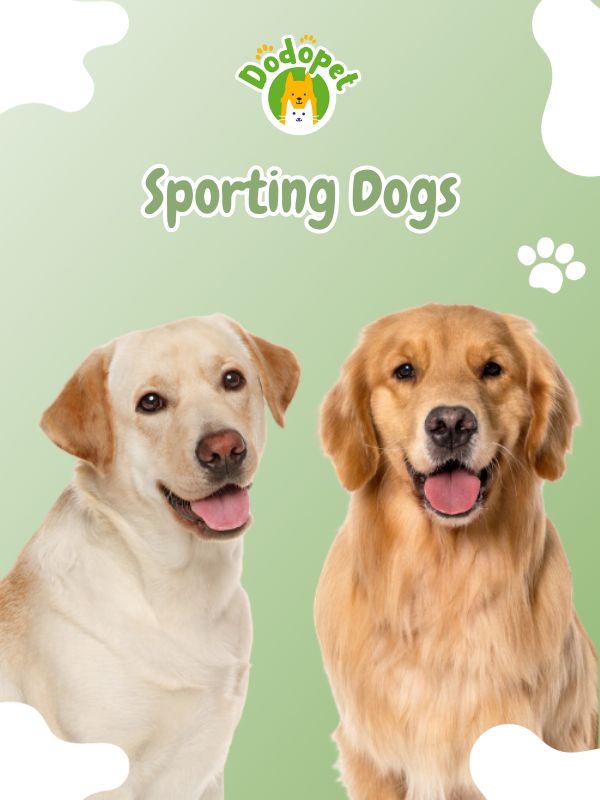
Sporting Dogs_ Active Types of Dogs
Working dogs: More Than Just a Pet
Working dogs are a group of breeds originally bred to perform various tasks, including herding, guarding, pulling loads, and assisting humans in various jobs. These dogs are often strong, intelligent, and have a strong work ethic. They make excellent companions for people who need assistance or have specific tasks that require canine help. Here are profiles and characteristics of some common working dog breeds:
- German Shepherd: German Shepherds are known for their intelligence, loyalty, and versatility. They are often used as police dogs, search and rescue dogs, and service dogs. They excel in obedience and protection work and are protective of their families.
- Siberian Husky: Siberian Huskies are strong and resilient dogs known for their ability to pull sleds in cold climates. They have striking blue eyes and a thick double coat. Huskies are energetic and require regular exercise.
- Alaskan Malamute: Alaskan Malamutes are similar to Huskies in appearance but are larger and more powerful. They were originally bred for heavy hauling and are known for their strength and endurance.
- Doberman Pinscher: Dobermans are known for their sleek, muscular appearance and are often used as guard dogs and police dogs. They are loyal and protective, making them excellent family protectors.
- Rottweiler: Rottweilers are powerful and sturdy dogs with a calm and confident demeanor. They are often used as working dogs in tasks like herding and guarding. They are loyal and protective but require early socialization and training.
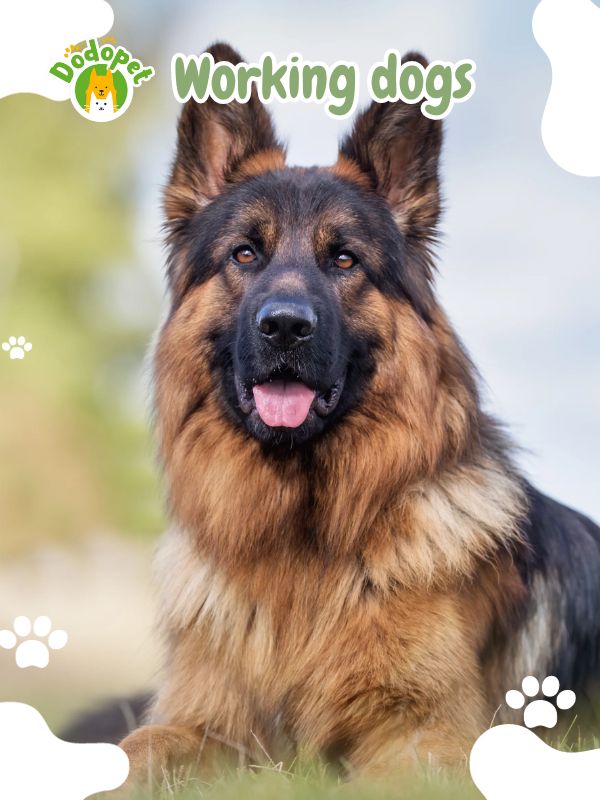
Working dogs_ More Than Just a Pet
Herding Dogs: Skillful Types of Dogs
Herding dogs, also known as herding breeds, were originally developed to work closely with livestock, helping shepherds and farmers control and move herds of animals. These dogs are highly intelligent, energetic, and often have a strong instinct to guide and control groups of animals. They make excellent companions for active individuals or families who can provide them with the mental and physical stimulation they need. Here are profiles and characteristics of some common herding dog breeds:
- Border Collie: Border Collies are widely regarded as one of the most intelligent dog breeds. They are known for their herding prowess, agility, and intense work ethic. They require mental challenges and plenty of exercise to stay happy.
- Australian Shepherd: Despite their name, Australian Shepherds were actually developed in the United States. They are highly intelligent and excel in herding and dog sports. They have striking blue eyes and a beautiful coat.
- German Shepherd: German Shepherds are versatile working dogs that are often used as herders and in various other roles such as police work and search and rescue. They are loyal and protective.
- Collie: Collies, including Rough Collies and Smooth Collies, are known for their gentle and friendly nature. They are excellent herding dogs with a strong instinct to protect and guide.
- Shetland Sheepdog (Sheltie): Shelties are small herding dogs known for their intelligence and agility. They excel in herding and obedience, and they are known for their affectionate personalities.
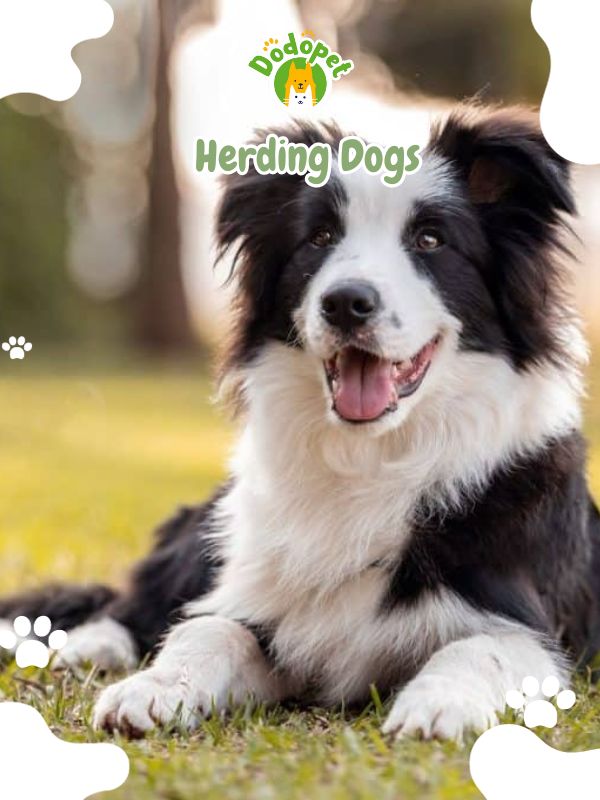
Herding Dogs_ Skillful Types of Dogs
Toy Dogs: Small Types of Dogs with Big Personalities
Toy breeds, in particular, are small dog breeds that exhibit a range of characteristics, which can make them excellent companions for individuals or families residing in smaller living spaces. These diminutive dogs are celebrated for their charming personalities and their suitability for indoor living. Here, we provide an overview of common toy dog breeds along with their distinct features:
- Chihuahua: Among the tiniest dog breeds globally, Chihuahuas are celebrated for their bold personalities, keen alertness, and unwavering devotion to their owners. These diminutive canines can have both long and short coats, offering a variety of choices for prospective pet owners.
- Pomeranian: Pomeranians are small, fluffy dogs exuding a vibrant and playful personality. Their thick double coat adds to their allure, and they are known for their lively and spirited nature, making them delightful companions.
- Yorkshire Terrier (Yorkie): Yorkies are characterized by their small size and long, silky coats. Their affectionate and loyal nature makes them wonderful family pets. Regular grooming is essential to maintain the beauty and health of their coat.
- Shih Tzu: Shih Tzus are small dogs draped in a flowing, long coat. Their friendly and affectionate disposition, along with their suitability for family life, makes them cherished companions. Consistent grooming is vital to ensure their coat remains in good condition.
- Maltese: Maltese dogs are renowned for their long, flowing white coats and their gentle and loving personalities. They are particularly well-suited to individuals who prefer small dogs and seek unwavering companionship.
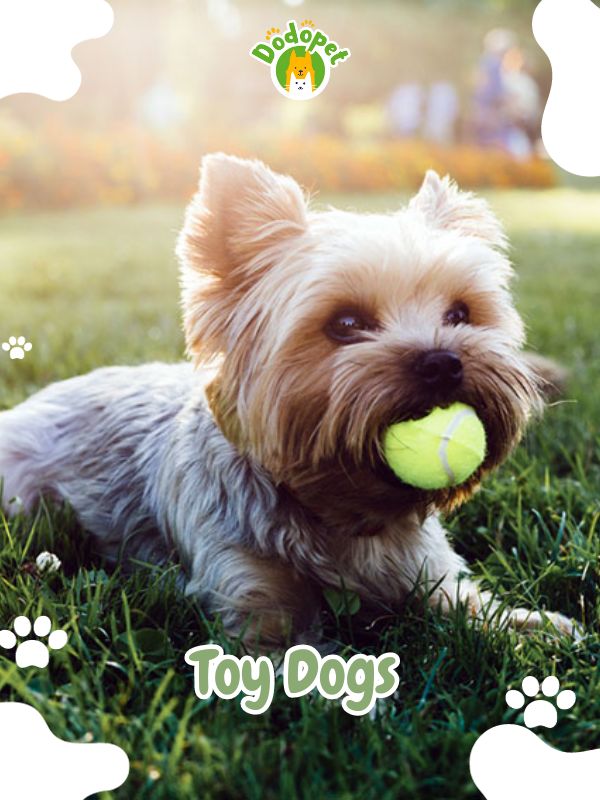
Toy Dogs_ Small Types of Dogs with Big Personalities
Non-sporting dogs: A Diverse Group of Breeds
Non-sporting dogs are a diverse group of breeds recognized by kennel clubs like the American Kennel Club (AKC) that do not fit into other traditional categories, such as sporting, herding, or working dogs. This group includes breeds with a wide range of appearances, sizes, and temperaments. Here are profiles and characteristics of some common non-sporting dog breeds:
- Poodle: Poodles come in various sizes, including standard, miniature, and toy. They are known for their intelligence, hypoallergenic coats, and versatility. Poodles are often seen in dog shows and are highly trainable.
- Bulldog: known for their distinctive wrinkled face and pushed-in nose. They have a calm and easygoing temperament. Despite their intimidating appearance, they are affectionate and loyal.
- Dalmatian: famous for their unique black or liver-colored spots. They are known for their high energy levels and love for exercise. They are often associated with firehouses and portrayed in movies.
- Bichon Frise: small, fluffy dogs with a cheerful disposition. They have a curly coat and are known for their playful and friendly nature.
- French Bulldog: smaller breed of bulldog known for their bat-like ears and charming personalities. They are affectionate, making them great companions.
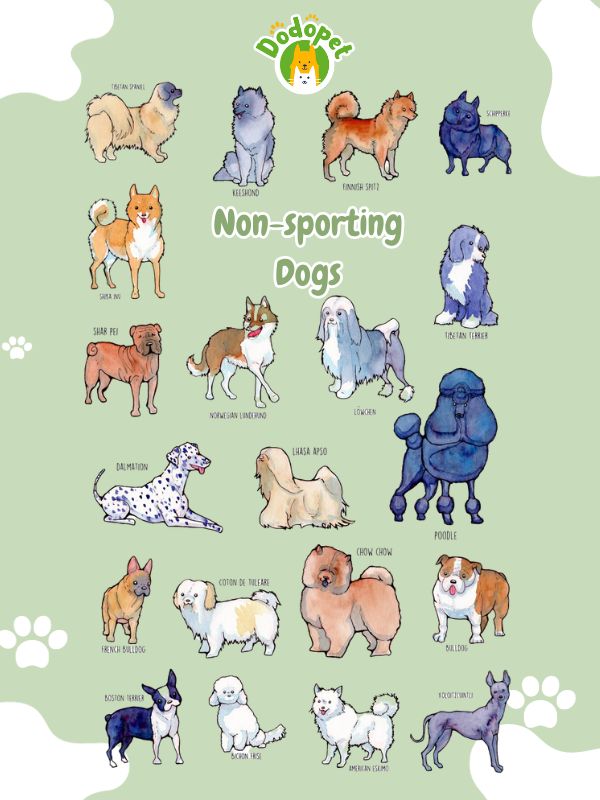
Non-sporting dogs_ A Diverse Group of Breeds
Hound Dogs: Unique Breed Features and Uses
The Hound Group is a category of dog breeds primarily bred for their hunting abilities, particularly their keen sense of smell and stamina when chasing game. These dogs have a strong instinct to follow scents and track prey. While many hound breeds are used for hunting, they also make excellent family pets due to their loyal and friendly nature. Here are profiles and characteristics of some common hound dog breeds:
- Beagle: small to medium-sized hounds known for their friendly and curious personalities. They have a strong sense of smell and are often used in hunting rabbits and other small game.
- Bloodhound: known for their incredible scent-tracking abilities. They have loose, wrinkled skin and long ears. They are gentle, affectionate, and excellent tracking dogs.
- Basset Hound: low to the ground with long ears and a keen sense of smell. They are known for their laid-back and easygoing nature.
- Greyhound: tall, slender dogs with incredible speed. They are known for their calm and gentle disposition. Despite their racing history, they make excellent companion animals.
- Dachshund: small hounds with long bodies and short legs. They were originally bred for hunting burrow-dwelling animals. They are lively, bold, and make great family pets.
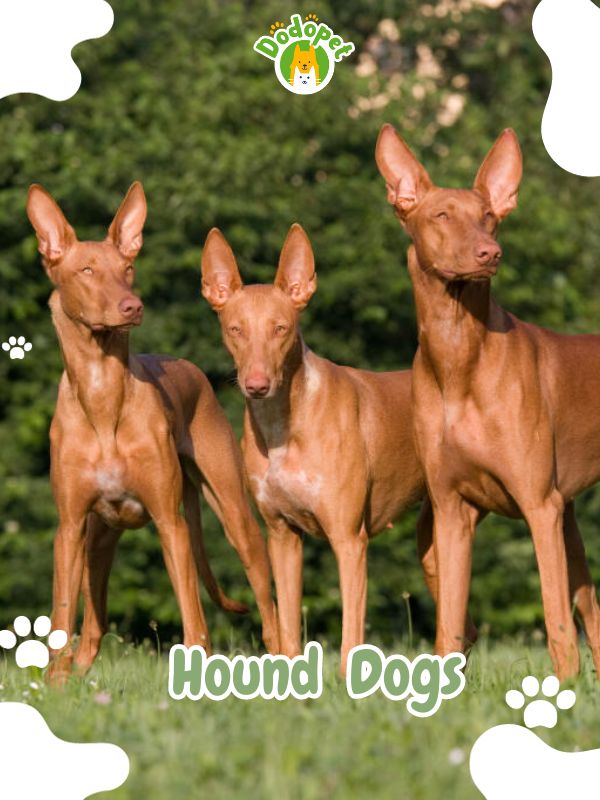
Hound Dogs_ Unique Breed Features and Uses
Terrier Dogs: A Look at Their Tenacious Traits
Terrier dogs are a diverse group of breeds known for their distinctive personalities, strong hunting instincts, and determination. These dogs were originally bred for hunting and killing vermin, which is why they often have a strong prey drive. Terriers are typically small to medium-sized, energetic, and full of character. Here are profiles and characteristics of some common terrier dog breeds:
- Jack Russell Terrier: small and highly energetic dogs known for their intelligence and agility. Moreover, they require plenty of exercise and mental stimulation.
- Scottish Terrier (Scottie): medium-sized terriers with a dignified and independent nature. In addition, they are known for their distinctive appearance and love of digging.
- West Highland White Terrier (Westie): In contrast, Westies are small terriers known for their white, fluffy coats and cheerful personalities. Moreover, they are social, friendly, and make great companions.
- Bull Terrier: On the other hand, Bull Terriers are muscular and have an egg-shaped head. Notably, they are known for their loyalty and playful nature. However, they require early socialization and consistent training.
- Airedale Terrier: In a different category, the Airedale Terriers are the largest terrier breed and are known for their courage and versatility. They are often referred to as the “King of Terriers.”
- Cairn Terrier: In a similar vein, Cairn Terriers are small and known for their rugged appearance. They are friendly and have a determined personality.
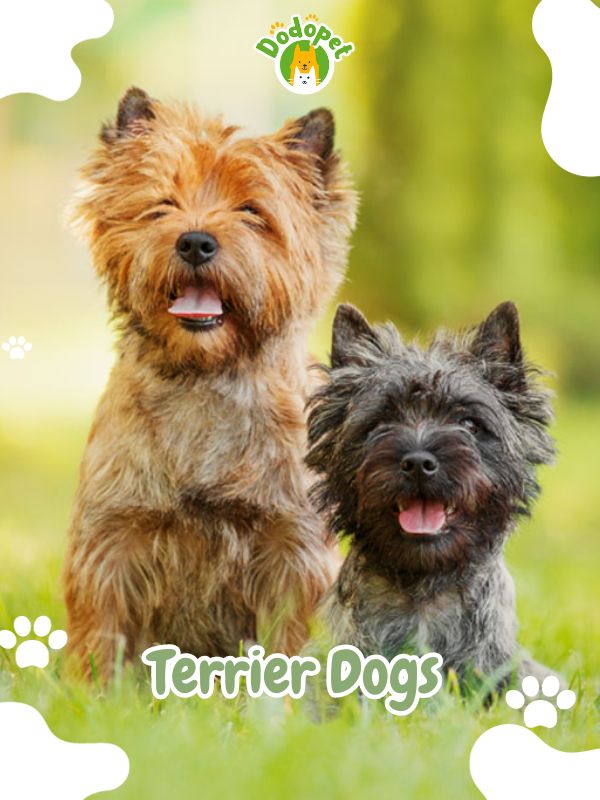
Terrier Dogs_ A Look at Their Tenacious Traits
Hybrid Breeds: The Rise of Designer Types of Dogs
Hybrid breeds, also known as designer dogs or crossbreeds, are created by mating two different purebred dogs from distinct breeds. The goal is to combine the desirable characteristics of each parent breed while minimizing potential health issues and temperament problems. Here are some examples of popular hybrid breeds and their characteristics:
- Labradoodle (Labrador Retriever + Poodle): Labradoodles are known for their intelligence, hypoallergenic coats, and friendly nature. Moreover, they make excellent family pets and are often used as service dogs.
- Cockapoo (Cocker Spaniel + Poodle): In contrast, Cockapoos are small, affectionate dogs with a friendly and playful disposition. They come in various coat colors and textures.
- Goldendoodle (Golden Retriever + Poodle): Additionally, Goldendoodles are friendly and intelligent. They often have wavy or curly coats and are known for their excellence in various roles, including therapy and assistance work.
- Maltipoo (Maltese + Poodle): In a similar vein, Maltipoos are small, fluffy dogs known for their charming personalities, making them wonderful companions, especially for people with allergies.
- Puggle (Pug + Beagle): On the other hand, Puggles are medium-sized dogs with the adorable wrinkled face of a Pug and the friendly, sociable nature of a Beagle. Furthermore, they are playful and energetic.
- Schnoodle (Schnauzer + Poodle): Schnoodles are intelligent and affectionate dogs. Notably, they often have a distinctive beard and come in various sizes, depending on the parent breeds.
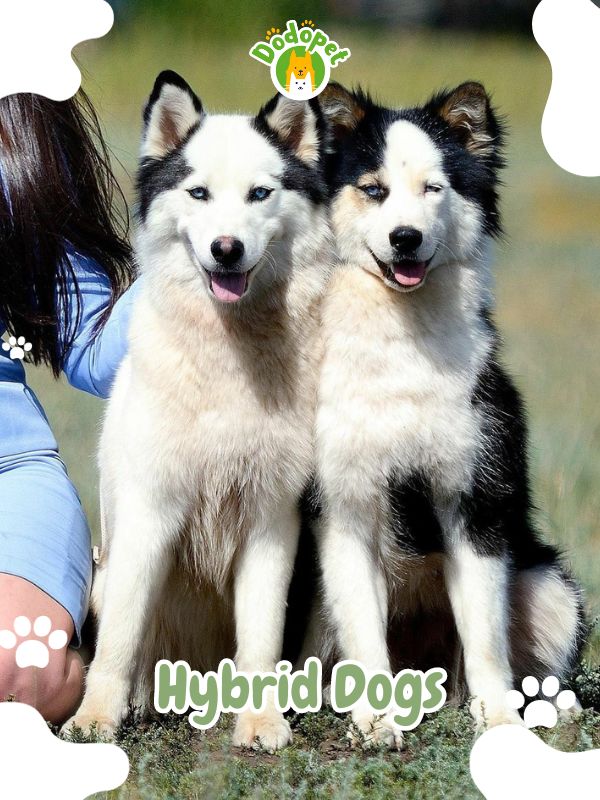
Choosing the Right Types of Dogs: Factors to Consider.
Choosing the right types of dog breeds is a significant decision that should be based on careful consideration of various factors. Different breeds have unique characteristics, temperaments, and care requirements. To help you make an informed decision, here are essential factors to consider when choosing a dog breed:
- Lifestyle: Evaluate your daily routine, activity level, and living situation. Some breeds require more exercise and mental stimulation, while others are content with a more relaxed lifestyle. Choose a breed that aligns with your daily life.
- Size and Space: Consider the size of your living space. Smaller breeds are often better suited for apartments or homes with limited space, while larger breeds may need more room to move around.
- Energy Level: Different breeds have varying energy levels. Active breeds like Border Collies and Labs require lots of exercise, while more laid-back breeds may be a better fit for a less active household.
- Allergies: If you or someone in your household has allergies, consider hypoallergenic breeds or breeds with low-shedding coats. Keep in mind that no dog is entirely hypoallergenic, but some breeds are better for allergy sufferers.
- Grooming Needs: Different breeds have different grooming requirements. Long-haired breeds may need regular brushing and professional grooming, while short-haired breeds typically require less maintenance.
- Temperament: Research a breed’s temperament to ensure it matches your personality and lifestyle. Some breeds are more independent, while others are highly loyal and affectionate. Consider whether you want a protective dog, a playful companion, or a more laid-back pet.
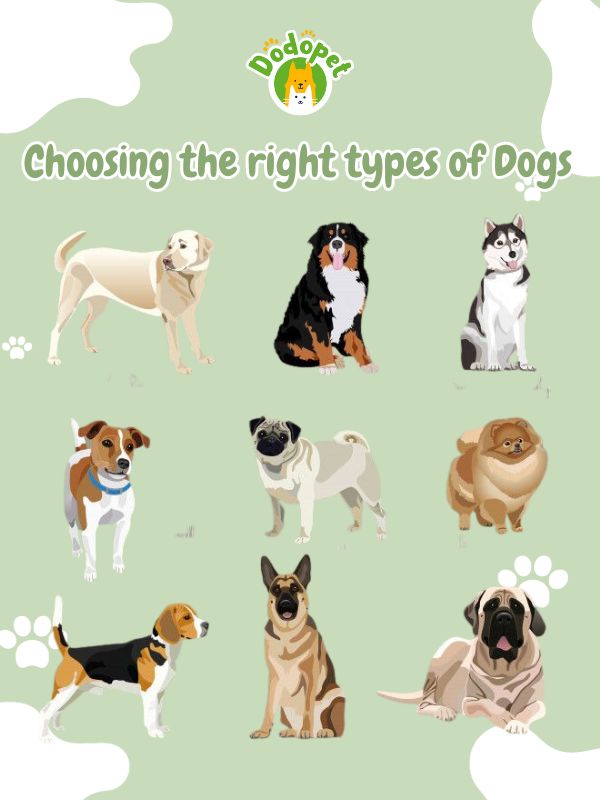
Choosing the Right Types of Dogs_ Factors to Consider
Conclusion
Discovering the all types of dogs and their unique qualities is an exciting journey for any dog lover. By understanding the various breeds, their characteristics, and their specific needs, you can make an informed decision when choosing a dog that fits your lifestyle and preferences.
Whether you are looking for a small companion, an active and energetic partner, a family-friendly pet, a guard dog, or a specialized breed, there is a perfect match out there for you. Embrace the diversity and beauty of the canine world and enjoy the companionship and love that dogs bring into our lives.

